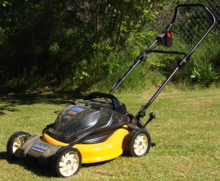- Organic lawn management
-
Organic lawn management is the practice of establishing and caring for a garden lawn using organic horticulture, without the use of chemical inputs such as pesticides or artificial fertilisers. It is a component of organic land care and organic sustainable landscaping which adapt the principles and methods of sustainable gardening and organic farming to the care of lawns and gardens.[1]
Contents
Techniques
Alternatives include the use of beneficial insects and natural predators such as nematodes to prevent infestation of lawns with pests such as crane fly larvae and ants, and preventing fungal infections through physical maintenance such as effective mowing and raking. Other 'environmentally friendly' techniques for caring for a lawn include irrigation only when the lawn shows signs of drought stress and then watering deeply - minimizing needless water consumption. Using low volume sprinklers provides more penetration without runoff. Lawnmowers with a mulching function can useful in reducing fertilizer use by allowing clippings that are cut so minutely that they can settle into the grass inconspicuously to decompose into the soil.
Organic fertilizers
A primary element of organic lawn management is the use of compost [2] and compost tea to reduce the need for fertilization and to encourage healthy soil that enables turf to resist pests.[3] A second element is mowing tall (3" - 4") to suppress weeds and encourage deep grass roots,[4] and leaving grass clippings on the lawn as fertilizer.[5] Additionally, fertilize in the fall, not the spring.[6]
Synthetic (inorganic based) fertilizers are made in a chemical process that uses fossil fuel and contributes to global warming. They also greatly increase the amount of nitrogen entering the global nitrogen cycle which has a serious negative impact on the organization and functioning of the world's ecosystems, including accelerating the loss of biological diversity and decline of coastal marine ecosystems and fisheries.[7] Nitrogen fertilizer releases N2O, a greenhouse gas, into the atmosphere after application.[8] Organic fertilizer nitrogen content is typically lower than synthetic fertilizer.[9]
Biodiversity
Organic lawns contribute to biodiversity, by definition, when they contain more than one or two grass species. Examples of additional lawn and grasslike species that can be encouraged in organic lawns include dozens of grass species (eight for ryegrass alone, sedges, mosses, clover, vetches, trefoils, yarrow, ground cover alternatives, and other mowable plants.[10]),.[11] Biodiversity increases the functioning and stress tolerance of ecosystems.[12] Lack of biodiversity is a significant environmental issue brought up by the use of lawns[13] with grassroots groups emerging to promote this method of lawn care.[14]
See also
References
- ^ A model for sustainable landscaping practices.
- ^ U.S. EPA Composting
- ^ Organic Landscaping at Harvard University
- ^ University of Minnesota Sustainable Urban Landscape Mowing Practices
- ^ MassDEP Don't Trash Grass
- ^ Cornell University, Lawn Care Without Pesticides
- ^ U.S. EPA The Global Nitrogen Cycle
- ^ Carbon sequestration and greenhouse gas emissions in urban turf, Amy Townsend-Small1 and Claudia I. Czimczik1, GEOPHYSICAL RESEARCH LETTERS, VOL. 37, L02707
- ^ Arizona Cooperative Extension Organic Fertilizers
- ^ Royal Botanic Garden Edinburgh
- ^ Canada Mortgage and Housing Corporation Low-Maintenance Lawns
- ^ Sustaining multiple ecosystem functions in grassland communities requires higher biodiversity
- ^ Organic Lawn Care Movement Developing Across the U.S.
- ^ Northeast Organic Farming Association Organic Land Care Program
External links
- Lawn care and how to get the very best from your lawn.
- Important and Easy Mowing and Watering Tips
- Natural vs. Chemical Lawn Care
- More organic lawn care tips
- Natural lawn care - aerating, pH soil levels, compost, natural fertilizers, pest control and more.
- Organic Lawns For America - An effective and easy to follow organic lawn care program that gets delivered right to your door.
- NOFA Organic Land Care - A non-profit program providing organic land care education and professional accreditation.
Horticulture and gardening Gardens 
Horticulture Organic Plant protection Categories:- Organic gardening
- Sustainable gardening
- Lawns
- Lawn care
Wikimedia Foundation. 2010.

